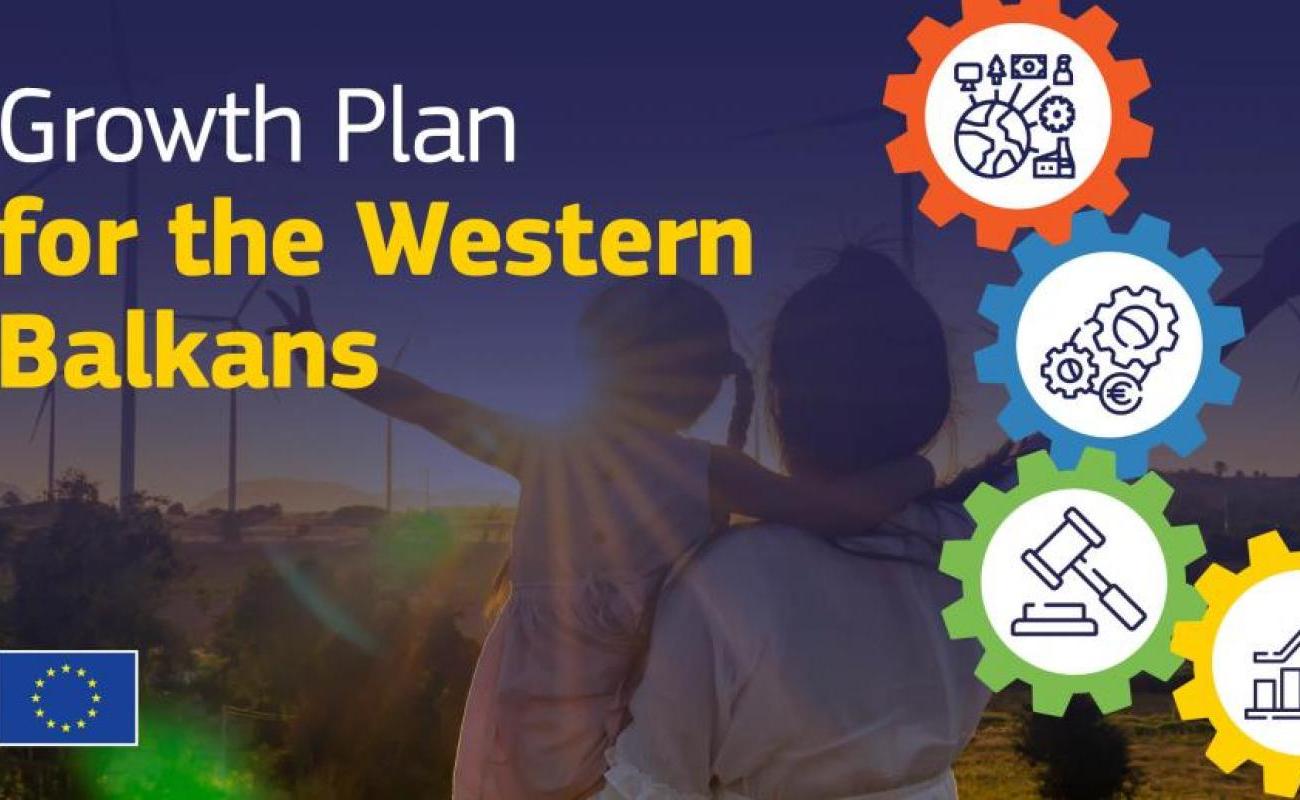Growth Plan for the Western Balkans – 20 months later

In November 2023, as part of the Enlargement package, the European Commission adopted a new Growth Plan for the Western Balkans. This mechanism ties funding (grants + loans from 2024–2027) to completion of country-specific “payment conditions”— milestone-driven reforms aligned with EU accession priorities.
The Western Balkan partners must implement key reforms to receive the €6 million allocated. They were invited to prepare Reform Programmes based on existing recommendations from the Enlargement Reports as well as the Economic Reform Programmes. These programmes have been assessed and adopted by the European Commission.
The core element of the Growth Plan for the Western Balkans, presented by the Commission in November 2023, is the Reform and Growth Instrument for the Western Balkans (the Instrument). The instrument was established by the European Parliament and the Council with the objectives of: (i) promoting sustainable economic growth; (ii) supporting public investment and structural reforms; (iii) enhancing the administrative and institutional capacity of the Western Balkans; and (iv) supporting beneficiaries from the Western Balkans on their path towards full EU membership by increasing their resilience, accelerating socio-economic convergence and reinforcing their commitment to reforms.
The instrument covers the period 2024-2027 and is expected to provide a) up to €2 billion in grants and b) €4 billion in loans to the EU’s Western Balkan partners. It complements the existing Instrument for Pre-Accession Assistance (IPA III) and significantly increases financial assistance to partners in the region.
Disbursements are subject to strict conditionality, with key reforms to receive these funds set out in the countries’ Reform Programmes. Some Balkan partners are making faster progress than others, and therefore have increased ambitions to advance in the negotiations.
In line with the progress in the implementation of the Reform Programmes, pre-financing (before the first tranche) has already been disbursed to the Republic of North Macedonia, Albania and Montenegro. Kosovo has not yet ratified the two agreements – the Facility Agreement and the Loan Agreement, as the parliament is not functioning.
The preparation for the disbursement of pre-financing for Serbia is currently in its final phase. The main reason for the delay in the disbursement of the pre-financing for Serbia is that, considering the Belgrade-Pristina Dialogue, the Instrument contains a condition for Serbia and Kosovo: that they engage constructively in the normalisation of their relations, with measurable progress and tangible results.
The EC decision on the disbursement of the first tranche of funds for Serbia and Kosovo, respectively, will also assess the fulfilment of the preconditions, including those on the Normalisation Dialogue, taking into account the latest developments on the subject. Most EU Member States are committed to maintaining a balanced approach and equal treatment of both parties in the Normalisation Dialogue. Due to the delay in the process, it may turn out that the pre-financing will be disbursed very shortly before the first tranche. It is then possible to wait for the assessment of preconditions, which is being made in connection with the first tranche, to ensure that the EC is sure that Serbia meets the conditions and the payment of pre-financing is actually due.
There are still no developments for BiH, as the country has not adopted a Reform Programme. In addition, some Member States insist that funds under the Instrument should not be used for projects that undermine the territorial integrity of BiH, i.e. those in Republika Srpska. It is possible that the Western Balkans Investment Framework (WBIF) will refuse to finance projects in Republika Srpska. (WBIF is a financial platform that coordinates and harmonises investments for socio-economic development in the region. It is a joint initiative of the EU, financial organisations, bilateral donors and beneficiaries, contributing to the European perspective of the Western Balkans).
By mid-March, the countries had to submit information on the implementation of the measures under the first tranche and the requests for EU funding. Serbia was the first to submit its information. The EC must prepare assessments on them within three months.
The Reform and Growth Instrument is quite complex to implement. Only a part of the loan funds are allocated by the EC to the country’s government. In parallel, the EC releases budget (from the loan and grant funds) for projects under the WBIF, but they are paid when specific projects have already been approved, and not immediately after their release.
The instrument is characterized by a strong level of conditionality. The conditions for granting funds do not allow for partial implementation of the relevant measure. Payment will only be made for a fully implemented measure. Candidate countries have a grace period of 12 months to implement delayed reforms, after which the funds are lost.
Progress in the implementation of reform programmes is measured by a set of indicators for the Reform and Growth Instrument. The EC is preparing an assessment of the package of measures for the first tranche. Since a number of measures have not yet been fully implemented, the first tranche is likely to be limited in size. This is not a sign that the Instrument is not working, but only that the time for implementation was limited.
As diplomats should monitor WB Reform and Growth Monitor outputs as early indicators of real reforms, the role of civil society is also essential. NGOs have little involvement in the preparation of the Reform Programmes, but it is important to participate in monitoring their implementation. Involving civil society in monitoring is important for increasing transparency and for the communication aspects of the Growth Plan.
